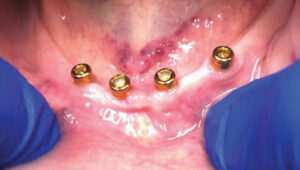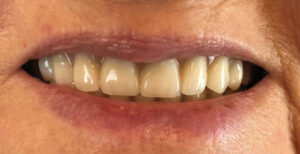
Transforming Dental Health With Implant Therapy
Age is not always a barrier to benefiting from modern dental advancements as seen in this case study of a 94-year-old woman.
In the previous edition of Perio Update, a case study was presented. The 94-year-old woman received an implant-retained mandibular denture, along with relining of her existing maxillary denture. The patient returned in 2 weeks and reported that everything was fine. She experienced no post-surgical discomfort and had not used any of the prescribed pain medications. The patient indicated being satisfied with the outcome. She was reminded to schedule bimonthly visits for the next 6 months.
In August 2022, the patient revisited for one of her routine follow-ups. Upon examination, the soft tissue appeared to be within normal limits. Neither mobility nor inflammation were noted, and she presented with minimal pocket depths. It was apparent the patient was doing an excellent job with self-care and denture cleaning, as well as her hygiene around the exposed implant attachment cuffs. She reported having no issues or discomfort, and that she was able to masticate without problems.

In September 2022, at 8 months post-implant placement, she presented for a routine check-up, and reiterated that she was satisfied with her implant-retained dentures and function. An examination revealed the soft tissue around the four implants was within normal limits. The exam found no discoloration of the soft tissue, inflammation, or bleeding upon probing. The charted notes recorded less than 1 mm probing depth beyond the cuff and no mobility (Figure 1). A review of her maxillary and mandibular dentures was unremarkable and indicated once again that she was following the oral hygiene instructions provided by the office. Figure 2 shows an extraoral view of the dentures in place.

At the 1-year post-implant placement visit in January 2023, another CBCT scan was scheduled as part of a routine follow-up examination.
Clinicians’ comfort levels in treating patients of advanced age have always been an issue in the dental office. Many practitioners will surmise that a patient may be too old or medically compromised to consider dental implants as part of a treatment plan. This is no longer the case. As this clinical report demonstrates, depending on the provider’s training, skill and confidence, older adults with many medical conditions can take advantage of recent advances in oral healthcare, including dental implants.
With the appropriate patient and proper treatment planning, adults in their 90s can still benefit from implant therapy.1 The resulting stability of the final appliance and marked improvement in the patient’s ability to masticate can improve quality of life, both mentally and physically. In addition, the improvement in digestion and nutrition facilitated by implant treatment can help support overall health and well-being.
Reference
This information originally appeared in Hottel T, Chirla C. Dental implants in older adults. Decisions in Dentistry. 2023;9(2):28-31.


